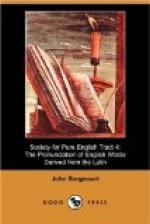It is possible that brattle has fallen into disuse through too indiscriminate application. After Burns’s famous poem the word can establish itself only in the sense of a scurrying dry noise: it is too small for thunder.
We would call attention to the principle involved in this judgement, for it is one of the main objects of our society to assist and guide Englishmen in the use of their language by fully exposing the facts that should determine their practice. Every word has its history, and no word can prosper in the speech or writing of those who do not respect its inherited and unalterable associations; these cannot be got rid of by ignoring them. Littr[’e] in the preface to his dictionary claims for it this pre-eminent quality of usefulness, that it will enable his countrymen to speak and write good French by acquainting them with historic tradition, and he says that it was enthusiasm for this one purpose that sustained him in his great work. Its object was to harmonize the present use of the language with the past usage, in order that the present usage may possess all the fullness, richness, and certitude which it can have, and which naturally belong to it. His words are: ’Avant tout, et pour ramener [`a] une id[’e]e m[`e]re ce qui va [^e]tre expliqu[’e] dans la Pr[’e]face, je dirai, d[’e]finissant ce dictionnaire, qu’il embrasse et combine l’usage pr[’e]sent de la langue et son usage pass[’e], afin de donner [`a] l’usage pr[’e]sent toute la pl[’e]nitude et la s[^u]ret[’e] qu’il comporte.’
It is the intention of our society to offer only expert and well-considered opinion on these literary matters, which are often popularly handled in the newspapers and journals as fit subjects for private taste and uninformed prejudice: and since the Oxford Dictionary has done more fully for English what Littr[’e] did for French, our task is comparatively easy. But experts cannot be expected, all of them, to have the self-denying zeal of [’E]mile Littr[’e], and the worth of our tracts will probably improve with the increase of our subscribers.
BICKER
As Burns happens to use bickering as his epithet for the mouse’s brattle, we may take this word as another illustration of Littr[’e]’s principle. The N.E.D. gives the original meaning as skirmish, and quotes Shakespeare,
If I longer stay
We shall begin our ancient bickerings,
which a man transposing the third and fourth words might say to-day without rising above colloquial speech; but there is another allied signification which Milton has in
Smoak and bickering flame;
and this is followed by many later writers. It would seem therefore, if the word is to have a special sense, that it must be focused in the idea of something that both wavers and skirmishes, and this suggests another word which caught our eye in the dictionary, that is




